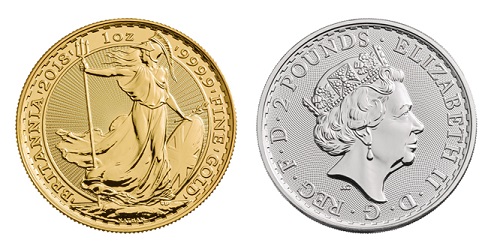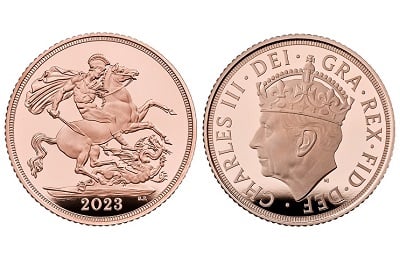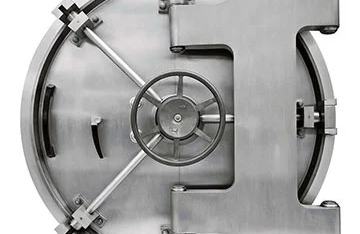Legal tender coins
Many of our customers ask what legal tender coins really means, and why the value on a bullion coin is different from the actual sale price of the coin, so we thought we’d explain below. Being officially classed as a legal tender coin, means it is exempt from Capital Gains Tax, so it can be an important and useful distinction to consider for investors.
Bullion coins, and many other
Proof
and
Brilliant Uncirculated coins,
have a monetary value stamped on them, typically ranging anywhere from £1 up to £100. This value classes them as Sterling currency and makes them exempt from certain taxation, but can be confusing given they are in fact worth considerably more. Adding to this confusion, the gold Sovereign (pictured below) is still considered legal tender, with a value of £1, but doesn't have this value physically stamped on the coin in the way most others do.

The Great Recoinage:
In 1816 the British Government acted to re-stabilise the nation’s currency, following the Napoleonic Wars. Dubbed ‘The Great Recoinage’, the government changed from Guineas to Sovereigns and brought silver currency back into circulation.
The regulations set out specific weights and purities – many of which are still adhered to today – but specifically it detailed that gold coins were legal tender for any amount, silver up to two pounds, and bronze up to one shilling. From this point, Sovereigns were considered as £1 coins, though due to inflation this pound is far greater than a £1 today. Learn more about Sovereign coin designs and years of issue.
These regulations were in place until 1870, at which point a Coinage Act passed powers to the government from the crown. Many of these coins were removed from circulation around the time of the First World War, with fiat currency (paper money) becoming the primary currency in the UK due to trade disruption from the conflict and subsequent precious metal shortages.
The 1971 Coinage Act amended the rules once more for The Royal Mint and the UK Government. The act was timed to account for the UK’s move away from imperial measures and the introduction of decimal currency.
Section 3 of the Coinage Act features a Royal Proclamation which states that the Queen can determine (read: approve) the denomination of coins to be made by The Royal Mint, as well as decide the design, weight, dimension, fineness, and composition of coins.

Legal Tender
The primary purpose of the legal tender value on British coinage is to settle debts in court. The technicality is that a debtor can’t be sued for not paying IF they pay into court with legal tender, of which precious metal bullion and proof coins from The Royal Mint count as a legitimate contribution.
There are limits to the values which can pay off a debt, which is to dissuade the public from paying fines or debts with vast quantities of low-value currency. This is negotiable though – the party due for reimbursement can be flexible with their payment expectations.

Uncirculated Coins
Many people confuse the legal tender value as meaning these coins can be spent in shops or sold to banks. This is not the case. The official definition is that only circulating legal tender coins are designed to be spent or traded with businesses and banks. Uncirculated coins, such as Bullion, Brilliant Uncirculated, and Proof coins, are not eligible.
Commemorative coins, which also have a face value, are often exempt from these rules due to the nature of their production and not always being made of a precious metal. Banks have been officially instructed to refuse these coins since 2016 following several
clashes between customers and The Royal Mint over the legal tender definition.

Capital Gains Tax
Many of our customers will know that any Royal Mint coins we sell with a face value listed are exempt from Capital Gains Tax – a government tax on profits above a certain level, achieved by selling assets such as bullion, property, or shares.
TCGA92/S21 (1) (b) of the Taxation of Chargeable Gains Act 1992 states that Sovereigns post-1837 and Britannias are exempt due to being classed as Sterling currency and thus legal tender coins. Sovereigns pre-1837 are considered chattels – personal possessions – and have been given a specific exemption.
The TCGA 1992 states:
‘all forms of property shall be assets for the purposes of this Act, whether situated in the United Kingdom or not, including... currency, with the exception (subject to express provision to the contrary) of sterling...’.
The Royal Mint has since clarified that the Queen’s Beast series and the Lunar coins also classify as legal tender coins because they adhere to the Britannia specifications and are thus exempt.
- How To Buy Gold
- How to Buy?
- Payment Options
- Delivery Options
- Gold Storage
- Storage at Brink's
- Gold Investment Guide
- Why buy gold?
- Is gold a good investment?
- Why physical gold?
- Best time to buy gold?
- Gold bars vs coins?
- Gold vs Silver
- Gold - Silver Ratio explained
- VAT on bullion
- CGT on bullion
- Legal tender coins
- Top 5 Gold Investments
- Top 5 Silver Investments
- Gold vs ISAs
- Gold vs Buy-to-Let
- Gold vs FTSE 100
- Gold vs Bitcoin
- Where to buy gold?
- Why buy from us?
- Where to sell gold?
- Coin Shops
- Gold Price Forecasts
- Top 10 Gold Producers
- Top 10 Gold Reserves
- Gold Britannia vs Sovereign
- Britannia coin designs
- Sovereign coin designs
- Sovereign Mintages
- Sovereign mint marks
- British coin specs
- What is a proof coin?
- Royal Mint bullion
- The Queen's Beasts
- Royal Mint Lunar Coins
- Bullion Refiners
- British coin mints
- Krugerrands
- Gold Tola - India & Pakistan
- Bullion Index







